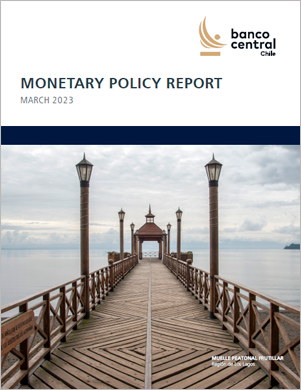Monetary Policy Report March 2023
Monetary Policy Report March 2023

Inflation remains at very high levels. Despite the decline in the annual variation of the CPI to 11.9% in February, it is still well above the 3% target. The core part of the CPI has been at around 11% annually for some time now, accumulating a significant surprise in recent months. Several factors explain why inflation is taking so long to come down. Most importantly, the economy has been unable to undo the impact of the overspending that accumulated in previous years. In fact, the revision of the national accounts showed that the level of consumption in previous years was higher than previously thought. Moreover, the pace of adjustment in recent years has been slower than expected. The improved performance in early 2023 leads to an upward revision of this year's GDP growth outlook. Nevertheless, the economy will further continue its adjustment process in the coming quarters, reflected in a lower forecast for 2024. Considering both years, cumulative growth is not far from our December forecast. Inflation will return to the 3% target in the latter part of 2024. The global economic outlook has become more difficult in recent weeks. The Chilean economy will be affected by weaker external demand and tighter global financial conditions. Overall, the current scenario is associated with a higher-than-usual degree of uncertainty. On the one hand, there is the risk of a more abrupt deterioration of the external scenario, with greater implications for Chile. On the other, the slow decline in domestic consumption could result in a more complex inflationary dynamic. The Monetary Policy Rate (MPR) has remained at 11.25% since October 2022. The Board considers that it will be necessary to keep the MPR at that level until macroeconomic conditions indicate that the process of inflation convergence to the 3% target has been consolidated. As described in the central scenario of this Report, this process will take longer than expected in December. The Board reaffirms its commitment to act with flexibility in case any of the internal or external risks materializes and macroeconomic conditions so require.
What does this MP Report tell us?

The economy’s adjustment process has not yet succeeded in reducing the effects of excessive spending.

Inflation is still very high and exceeds four times the Central Bank’s inflation target
- Inflation remains above the 3% target, despite some decline in recent months.
- The prices of fuels and some foodstuffs have dropped, which has helped to bring down inflation.
- However, other prices have been more resistant to decline, despite the decline in some price drivers, such as the exchange rate and international transportation costs.
- Some other prices —e.g., services— have seen larger-than-expected hikes, whose readjustments have been based on the higher inflation of past months.
- Stubbornly high prices are also being observed in other economies around the world.
- All considered, we project that inflation will continue to decline and will return to 3% annually towards the end of next year.

The economy’s adjustment process has not yet succeeded in reducing the effects of excessive spending
- For several quarters, spending grew beyond its possibilities, driven by policies that provided people with excess liquidity. This led to a sharp rise in inflation, which still has not been able to return to its usual levels, i.e., around 3% per year.
- For inflation to decline, it is necessary for spending to go back to evolve in line with income. This has been gradually occurring, but very slowly.
- People have been observed to increase their indebtedness at high interest rates, meaning that the cost of their credit has soared.
- This may jeopardize their capacity to repay their loans, as reflected in some delinquency indicators.

Inflation that remains high for a long time affects everybody, but most severely the lower-income people
- High inflation going on for too long affects the purchasing power of the salaries of workers whose contracts are not adjusted for inflation, while increases the cost of inflation-indexed mortgage loans.
- Companies’ decisions are also affected: it is more difficult for them to obtain credit and it is more difficult to repay their debts and collect their receivables. This translates into reduced possibilities to invest, to hire staff and/or to raise the salaries of their workers.
- All this impacts on the growth capacity of the economy, job creation and, ultimately, people’s well-being.
- Thus, the best way for the economy to resume growing in line with its potential is for inflation to return to the 3% target
- The Central Bank will continue to use all its capacities to achieve this objective.

Our economy is exposed to significant risks whose evolution the Central Bank will monitor closely
- In recent weeks, the situation of some banks in the U.S. and Europe has caused concern in financial markets worldwide. This has affected stock markets, exchange rates, interest rates and investor confidence.
- Economic policymakers in a number of countries have taken action to ensure curbing down the effects of this problem, which has allowed financial markets to operate more smoothly.
- Chilean banks are capable of facing a complex international scenario, mainly because the law establishes adequate regulation of the sector and because they are constantly undergoing evaluations to assess their reactions to stressful episodes.
- The institutions in charge of the regulation and supervision of banks in Chile, including the Central Bank, will keep a watchful eye on the capacity of the financial system to deal with contingencies and to act as needed.
Presentations
Informe de Política Monetaria marzo 2023. Rosanna Costa, Presidenta
Conferencia de Prensa: Informe de Política Monetaria marzo 2023
- Presentación IPoM, Senado. Rosanna Costa, Presidenta
- Presentación IPoM, Icare. Rosanna Costa, Presidenta
- Presentación IPoM, BanChile. Pablo García
- Presentación IPoM, Universidad Adolfo Ibáñez. Pablo García
- Presentación IPoM, Banco Mundial y del Fondo Monetario Internacional. Pablo García
- Presentación IPoM. Universidad de Talca. Luis Felipe Céspedes
- Presentación IPoM, Universidad de Chile. Alberto Naudon
- Presentación IPoM, Universidad del Desarrollo. Pablo García
- Presentación IPoM. Universidad Central. Luis Felipe Céspedes
- Presentación IPoM, Banco de Chile. Rosanna Costa, Presidenta
- Presentación IPoM, Instituto Libertad y Desarrollo. Alberto Naudon
- Presentación IPoM, BBVA Latin AmericaConference. Luis Felipe Céspedes
- Presentación IPoM, Escuela de Comercio de Santiago. Pablo García
